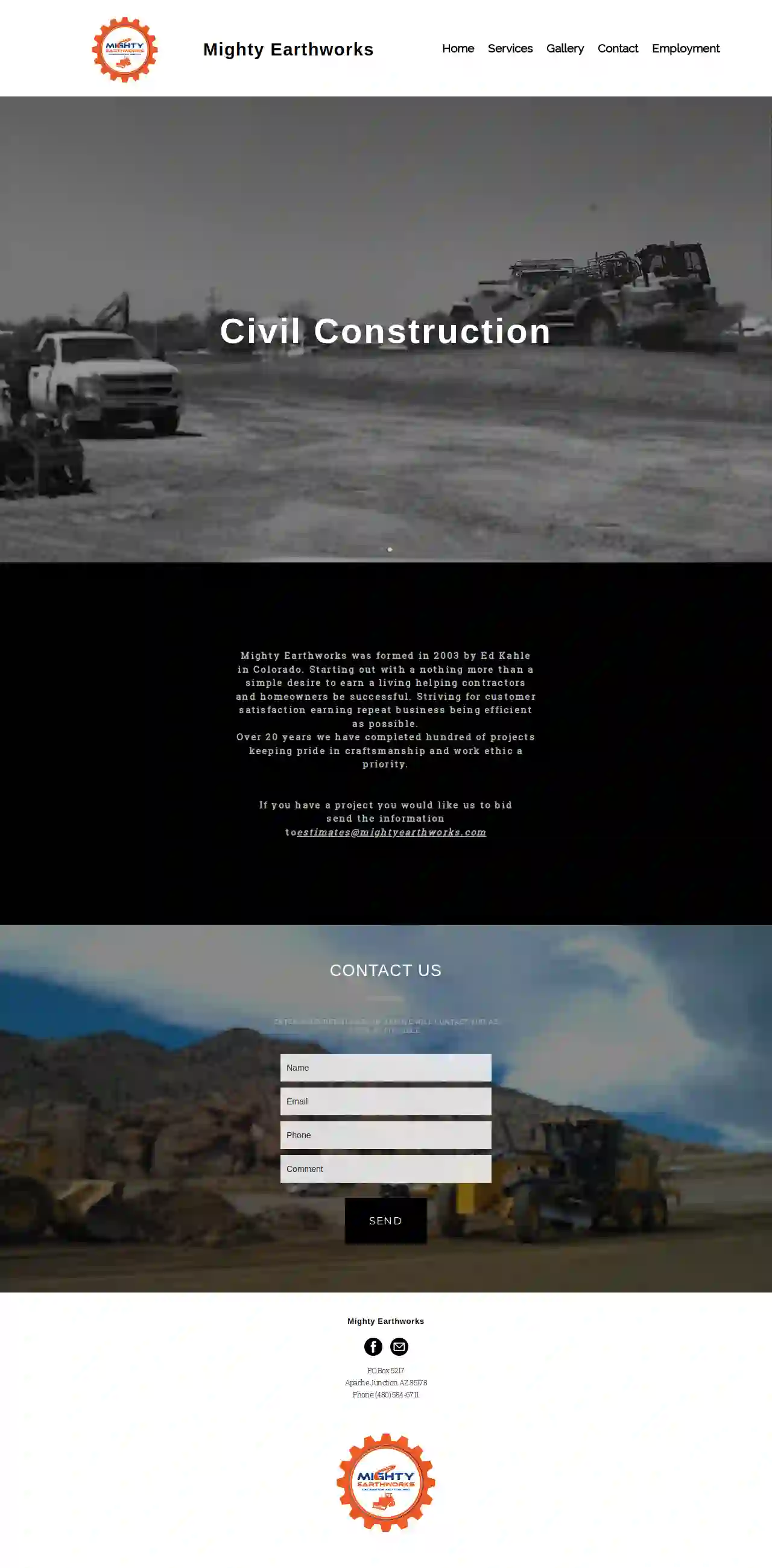Excavation Contractors Prescott Valley
Top 10 Excavation Company Near Me in Prescott Valley
Get up to 3 Excavating Contractors quotes for your project today! Compare profiles, reviews, accreditations, portfolio, etc... and choose the best deal.

Kimble Landscaping & Excavating Inc
2.910 reviews22811 Hardscrabble Rd., Sparland, 61565, USWITH KIMBLE EXCAVATING, THERE'S NO JOB TOO BIG OR TOO SMALL Call us today to get started on your next project. A FEW OF OUR PROJECTS FOUNDATION REPAIR Your building may need an inspection if you notice water logging at the foundation instead of it flowing away from your home. Oftentimes, water will get trapped within the foundation, freeze, and then cause the foundation to crack. View more EXCAVATING From grading and finish seeding to ponds and creek crossings, we offer a wide variety of excavating services to meet your needs. View more CONCRETE & ROCK We can handle any concrete and rock installations or repairs for residential and agricultural settings. View more SERVING THE FOLLOWING COMMUNITIES FOR OVER 40 YEARS: Peoria, Dunlap, Washington, East Peoria, Germantown Hills, Princeville, Hanna City, Spring Bay, Chillicothe, Bartonville, Sparland, Lacon, Henry
- Services
- Why Us?
- Gallery
Get Quote
Vickers Landscape LLC
52 reviewsPhoenix, USVICKERS LANDSCAPE Servicing Arizona since 1999 LANDSCAPE ARCHITECTURE Licensed, Bonded & Insured RESIDENTIAL & COMMERCIAL SERVICE Affordable Landscaping
- Services
- Why Us?
- Gallery
Get Quote
Goodwillie Earthwerks
52 reviewsTucson, USOver 2 Decades of Excavation Experience Goodwillie Earthwerks has nearly two decades of experience in excavation, demolition, clearing and hauling. We offer a wide array of services from basic grading and drainage solutions to utility infrastructure design and install. At Goodwillie Earthwerks, we take great pride in our reputation in quality work and highly satisfied customers. Why Choose Our Excavating Contractor? We gladly go the extra mile to ensure your 100% satisfaction! Goodwillie Earthwerks, Inc is a locally owned and operated excavating company in Tucson, AZ. We are your top choice for excavating contractors! If you're looking for a professional excavating contractor in the Oro Valley and Tucson, AZ area who specializes in excavation needs and services, look no further than Goodwillie Earthwerks. Our excavating company can handle everything for you! We've been providing long-term care and attention to detail when you need work done on your commercial property for many years. We strive to provide quality and professional workmanship at competitive prices for all types of excavation work. You can rely on our team of experienced excavating professionals to be there for you from the first consultation to the big reveal! Goodwillie Earthwerks is a group of highly trained excavating professionals who pay attention to the smallest details and strive for excellence. Using our services can improve the appearance of your commercial or residential property and increase its value. Your commercial and residential properties will look great when you choose to work with Goodwillie Earthwerks's excavating contractor! When you give us a call, you will be connected directly to our owner, so you can expect immediate attention to your inquiry. So, don’t wait. Call us today!
- Services
- Why Us?
- Testimonials
- Gallery
Get Quote
A&E Excavation
51 reviewsPMB 102, 1945 Scottsville Rd B2, Bowling Green, 42104, USFrom The Ground Up A&E Excavation and A&E Trucking offers an extensive range of services encompassing all facets, from excavating footers to providing topsoil, ensuring the project's successful conclusion. Who We Are A&E Trucking and Excavation, a company based in Bowling Green, KY, prides itself on being both owned and operated by Veterans. Our commitment lies in executing every task with the utmost professionalism. We eagerly anticipate the opportunity to assist you in bringing your commercial and industrial projects to fruition. Reach out to us today for further information. Excavation Pros at setting up building pads, parking lots, footings, utilities, septic systems, and leveling the playing field! Trucking We offer a range of materials including topsoil, fill dirt, and various types of stone. Additionally, the company specializes in custom hauling and haul-off services. Pride In Our Community Our core objective revolves around supporting businesses in actualizing their commercial and industrial ventures. Our organization is dedicated to delivering vital services to our growing community. We are enthusiastic about furthering our involvement as our community flourishes. From Site Prep To Topsoil We possess the expertise to manage projects of various scales. Whether you are at the inception or culmination of your project, our support remains unwavering. Initiate contact with us to explore how we can contribute to realizing your project aspirations. Commercial & Industrial Ensuring your satisfaction with the level of professionalism maintained at each job site is of utmost importance. Contact us for a free consultation. Multi-Residential Site Prep Initiate your subdivision project successfully by leveraging the expertise of A&E professionals. Contact us today! Commercial Site Prep A&E is proficient in preparing construction sites to facilitate seamless operations. Topsoil If your project requires topsoil, please reach out to A&E Trucking to arrange for a prompt delivery. Contact us! Stone Stone for your upcoming project? Our supply encompasses a diverse array of stone types. Commercial & Industrials Let's Create Something Great We approach every project with confidence and enthusiasm, ready to collaborate with each and every customer. Our primary objective is to provide exceptional service, regardless of the scale of the project. Engage us in your upcoming development; we are eager to combine efforts and create remarkable outcomes together. Let us embark on this exciting journey side by side! Backfill and Recompacting We specialize in precise backfilling, ensuring proper compaction from start to finish. A&E Excavating is renowned for its unmatched industry expertise and a vast clientele who are consistently satisfied, positioning us as a reputable leader in grading, excavation, recompacting, and similar services.
- Services
- Why Us?
- Gallery
Get Quote
Revolutionary Contracting
4.930 reviewsPhoenix, US#1 LOCAL CONTRACTOR MIDDLE TENNESSEE We Get Your Project Done Right from Roofs to Renovation Revolutionary Contracting is the premier contractor in Indian Mound and Clarksville, TN. Our professional team is experienced, reliable, and honest. Our goal is to be the local contractor Middle Tennessee focused on exceptional service for all of our customers. We are your full-service contractor for your whole project, start to finish. From design, drone operations, remodeling, roofing, to new construction. We cover all of your residential and commercial contracting needs throughout Middle Tennessee. Revolutionary Contracting is proud to be Veteran-owned & Operated! EXPERIENCED Over 35 years of experience in the industry! HONEST We pursue integrity in every aspect of our business. RELIABLE You can count on us to do what we say! Remodeling Contractor Middle Tennessee Any issues with your property, turn to Revolutionary Contracting. We have over 35 years of experience in the industry, and you count on amazing results. Our service range from all aspects of construction and repairs for both residential and commercial properties.You can call on our remodeling company for home improvements, kitchen and bathroom renovations, storm damage repair, landscaping, property inspections, and more. Plus, our contractors are certified to fly drones commercially.You can trust our team to make your vision a reality! Call (931) 627-4813 to schedule a free estimate for any of your home improvement needs. Be sure to ask about our 10% discount for US military members, first responders, and senior citizens. Proudly Offering Financing Through our Partner Hearth!
- Services
- Why Us?
- Gallery
Get Quote
Mighty Earthworks LLC
24 reviewsP.O.Box 5217, Apache Junction, 85178, USCivil Construction EARTHWORK IS OUR PASSION. Mighty Earthworks was formed in 2003 by Ed Kahle in Colorado. Starting out with a nothing more than a simple desire to earn a living helping contractors and homeowners be successful. Striving for customer satisfaction earning repeat business being efficient as possible. Over 20 years we have completed hundreds of projects keeping pride in craftsmanship and work ethic a priority. If you have a project you would like us to bid, send the information to [email protected]
- Services
- Why Us?
- Gallery
Get Quote
Art barber Excavating
4.312 reviews3370 W. Sabin Brown Road, Suite A, 3370 W. Sabin Brown Road Suite A, Wickenburg, 85390, USArt Barber Excavating Art Barber Excavating And Decorative Rock. Art Barber Excavating, a family-owned and operated business since 1981, is located in Wickenburg, Arizona. We specialize in providing a wide range of excavating services and decorative rock delivery. Our commitment to customer satisfaction is evident in our dedication to treating every customer like family. We offer a comprehensive selection of landscaping products and excavating services to meet your residential or commercial needs. Our services include: Site excavation Grading Septic tank installation Brush removal Demolition Driveway grading Decorative rock delivery Arena sand delivery Mulch delivery Screened fill dirt delivery Unscreened fill dirt delivery We are proud to have built a strong reputation as the leading excavating contracting company in our area. Our team of experienced professionals is dedicated to providing high-quality services that meet your specific needs and exceed your expectations.
- Services
- Why Us?
- Gallery
Get Quote
MB LANDSCAPE LLC
515 reviewsPhoenix, USAt MB Landscape, we pride ourselves on delivering high quality residential and commercial services. We prioritize your needs by listening and paying attention to every detail of your project, and we work hard to ensure your satisfaction is our number one priority. View our services to see how we can help you knock out your next project on time and on budget!
- Services
- Why Us?
- Gallery
Get Quote
Oakwood Landscaping
49 reviewsBox 9124, Peoria, 61612, USOakwood Landscaping: Your Trusted Partner for Beautiful Landscapes Oakwood Landscaping, established in 2001 by Steve Wallace, has been serving the Peoria, IL area for over two decades. With a deep understanding of the landscaping industry, Steve brings years of experience and a commitment to quality to every project. We specialize in both residential and commercial landscaping, offering a comprehensive range of services to enhance your property's beauty and functionality. At Oakwood Landscaping, we take pride in our dedicated team of professionals. We are committed to delivering the highest level of service and attention to detail, ensuring your complete satisfaction. Whether you need a stunning landscape design, meticulous maintenance, or reliable snow removal, we are here to meet your needs. We believe in building lasting relationships with our clients. Contact us today for a free estimate and let us help you transform your outdoor space into a haven of beauty and tranquility.
- Services
- Why Us?
- Gallery
Get Quote
Suburban Landscaping
3.98 reviewsPeoria, USSuburban Landscaping: Transforming Your Outdoor Vision Suburban Landscaping is a premier landscaping company serving Peoria, Illinois. We specialize in creating beautiful and functional outdoor spaces that enhance the beauty and value of your property. From meticulous lawn care to stunning landscape designs, we offer a comprehensive range of services to meet your unique needs. Our team of experienced professionals is dedicated to providing exceptional customer service and high-quality workmanship. We take pride in our attention to detail and commitment to exceeding your expectations. Whether you're looking to create a relaxing oasis, a vibrant garden, or a low-maintenance landscape, we have the expertise and creativity to bring your vision to life. At Suburban Landscaping, we believe that your outdoor space should be an extension of your home, a place where you can relax, entertain, and enjoy the beauty of nature. We are committed to providing you with the best possible experience, from the initial consultation to the final touches.
- Services
- Why Us?
- Gallery
Get Quote
Over 3,943+ Excavation Businesses on our platform
Our excavation experts operate in Prescott Valley and beyond!
ExcavationHQ has curated and vetted Top Excavation Contractors in and around Prescott Valley. Find a reliable business today.
Frequently Asked Questions About Excavation Contractors
- Utility Locates: Contact your utility companies to mark the locations of underground lines before excavation begins. This is usually a free service.
- Hand Digging: Excavate carefully by hand near marked utility lines to avoid damage.
- Potholing: Digging small test holes to expose and verify utility depths and locations.
- Safe Distances: Maintaining a safe distance between excavation equipment and marked utility lines.
- Vacuum Excavation: Using vacuum excavation techniques to expose utilities without digging, reducing the risk of damage.
- Excavations Deeper Than a Certain Depth: This varies by jurisdiction, usually around 5 feet.
- Excavations Near Utilities: Digging near buried utilities (gas, water, electric) often requires permits and utility locates to prevent damage.
- Excavations Affecting Public Property: Projects impacting sidewalks, roads, or other public areas typically require permits.
- Excavations in Environmentally Sensitive Areas: Projects in wetlands, floodplains, or other sensitive areas might need special permits.
- Spring and Fall: Often considered favorable due to moderate temperatures and drier soil conditions.
- Summer: Can be suitable, but hot weather can make working conditions challenging and might require additional measures (shade, hydration) for workers.
- Winter: Excavation in winter can be more difficult due to frozen ground, snow, and potential delays caused by inclement weather. It might also require specialized equipment or techniques.
- Mechanical Excavation: Utilizing heavy equipment like excavators, backhoes, bulldozers, and loaders, suitable for most projects.
- Hand Excavation: Using hand tools (shovels, picks) for smaller excavations or delicate work near utilities.
- Blasting: Employing explosives to break up rock or hard materials, typically for large-scale projects.
- Hydro Excavation: Using high-pressure water jets to loosen and remove soil, often used for locating utilities or delicate excavation.
- Vacuum Excavation: Employing a vacuum system to suck up excavated material, suitable for safe excavation near utilities or in confined spaces.
How do you protect utilities during excavation?
Do I need a permit for excavation?
What is the best time of year for excavation?
What are the different methods of excavation?
How do you protect utilities during excavation?
- Utility Locates: Contact your utility companies to mark the locations of underground lines before excavation begins. This is usually a free service.
- Hand Digging: Excavate carefully by hand near marked utility lines to avoid damage.
- Potholing: Digging small test holes to expose and verify utility depths and locations.
- Safe Distances: Maintaining a safe distance between excavation equipment and marked utility lines.
- Vacuum Excavation: Using vacuum excavation techniques to expose utilities without digging, reducing the risk of damage.
Do I need a permit for excavation?
- Excavations Deeper Than a Certain Depth: This varies by jurisdiction, usually around 5 feet.
- Excavations Near Utilities: Digging near buried utilities (gas, water, electric) often requires permits and utility locates to prevent damage.
- Excavations Affecting Public Property: Projects impacting sidewalks, roads, or other public areas typically require permits.
- Excavations in Environmentally Sensitive Areas: Projects in wetlands, floodplains, or other sensitive areas might need special permits.
What is the best time of year for excavation?
- Spring and Fall: Often considered favorable due to moderate temperatures and drier soil conditions.
- Summer: Can be suitable, but hot weather can make working conditions challenging and might require additional measures (shade, hydration) for workers.
- Winter: Excavation in winter can be more difficult due to frozen ground, snow, and potential delays caused by inclement weather. It might also require specialized equipment or techniques.
What are the different methods of excavation?
- Mechanical Excavation: Utilizing heavy equipment like excavators, backhoes, bulldozers, and loaders, suitable for most projects.
- Hand Excavation: Using hand tools (shovels, picks) for smaller excavations or delicate work near utilities.
- Blasting: Employing explosives to break up rock or hard materials, typically for large-scale projects.
- Hydro Excavation: Using high-pressure water jets to loosen and remove soil, often used for locating utilities or delicate excavation.
- Vacuum Excavation: Employing a vacuum system to suck up excavated material, suitable for safe excavation near utilities or in confined spaces.